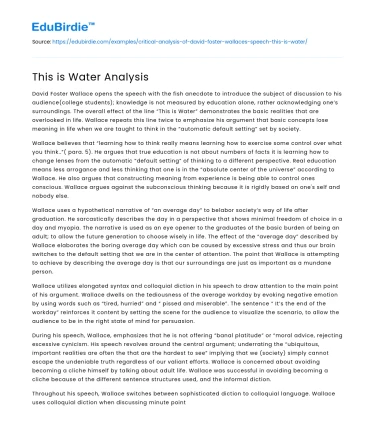David Foster Wallace opens the speech with the fish anecdote to introduce the subject of discussion to his audience(college students); knowledge is not measured by education alone, rather acknowledging one’s surroundings. The overall effect of the line “This is Water” demonstrates the basic realities that are overlooked in life. Wallace repeats this line twice to emphasize his argument that basic concepts lose meaning in life when we are taught to think in the “automatic default setting” set by society.
Wallace believes that “learning how to think really means learning how to exercise some control over what you think..”( para. 5). He argues that true education is not about numbers of facts it is learning how to change lenses from the automatic “default setting” of thinking to a different perspective. Real education means less arrogance and less thinking that one is in the “absolute center of the universe” according to Wallace. He also argues that constructing meaning from experience is being able to control ones conscious. Wallace argues against the subconscious thinking because it is rigidly based on one's self and nobody else.
Save your time!
We can take care of your essay
- Proper editing and formatting
- Free revision, title page, and bibliography
- Flexible prices and money-back guarantee
Wallace uses a hypothetical narrative of “an average day” to belabor society’s way of life after graduation. He sarcastically describes the day in a perspective that shows minimal freedom of choice in a day and myopia. The narrative is used as an eye opener to the graduates of the basic burden of being an adult; to allow the future generation to choose wisely in life. The effect of the “average day” described by Wallace elaborates the boring average day which can be caused by excessive stress and thus our brain switches to the default setting that we are in the center of attention. The point that Wallace is attempting to achieve by describing the average day is that our surroundings are just as important as a mundane person.
Wallace utilizes elongated syntax and colloquial diction in his speech to draw attention to the main point of his argument. Wallace dwells on the tediousness of the average workday by evoking negative emotion by using words such as “tired, hurried” and “ pissed and miserable”. The sentence “ It’s the end of the workday” reinforces it content by setting the scene for the audience to visualize the scenario, to allow the audience to be in the right state of mind for persuasion.
During his speech, Wallace, emphasizes that he is not offering “banal platitude” or “moral advice, rejecting excessive cynicism. His speech revolves around the central argument; underrating the “ubiquitous, important realities are often the that are the hardest to see” implying that we (society) simply cannot escape the undeniable truth regardless of our valiant efforts. Wallace is concerned about avoiding becoming a cliche himself by talking about adult life. Wallace was successful in avoiding becoming a cliche because of the different sentence structures used, and the informal diction.
Throughout his speech, Wallace switches between sophisticated diction to colloquial language. Wallace uses colloquial diction when discussing minute points in his speech such as “...you will totally hose…” (para. 5) and “ The point is that petty, frustrating crap…” (para. 9). It is appropriate for Wallace to use colloquial language to make the audience feel identified and experience a personal connection between the speaker and the audience.
Wallace builds a tension between two ways of being/living in the world to allow the audience to chose which side would they rather live. Wallace described the two ways of being are those who are aware of their surroundings and those who are not. Those who are truly educated, those who know the “Capital T Truth”, and those who have freedom, are the ones that are aware of their surroundings. He explains the difference between the two and gives multiple examples such as the Fish story and describing the “average day of work” in depth. However, it is evident that he supports those who are aware of their surroundings more by using negative connotations toward the opposing way of living. He describes the opposing argument in a sarcastic, cynical tone implying that those who choose that life tend to be “pissed and miserable”
This is Water speech embodies several characteristics of a commencement speech. Wallace does not directly acknowledge the graduates for their achievements or progress in life, instead, he prepares the graduates for the near future. Although Wallace did not acknowledge the audience he does creat and identification between the graduates and himself in several instances. For example, he introduces himself in an informal way by creating a common ground between Wallace and the audience when he states “you’re worried that I plan to represent… I am not the wise old fish.” (para. 2). Wallace also presents the world and its challenges when describes the adult life in paragraphs 7-11. The author presents hope in a dramatic way to the audience, the hope that he presents is when he says “we have to keep reminding ourselves over and over: ‘ This is water, this is water.’” He believes that the only hope left is being aware of our surroundings and reminding ourselves where we stand in society.






 Stuck on your essay?
Stuck on your essay?

